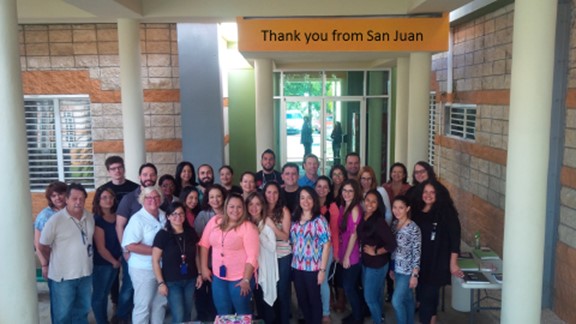Deployment to Puerto Rico to Support Laboratory Testing for Zika, 2016
By LCDR Eduardo Gomez-Saladin
Deputy Director
Officer of Laboratory Safety, Office of the Director
Centers for Disease Control and Prevention
What is your current assignment in USPHS?
I am the Deputy Director, Office of Laboratory Safety, CDC OD.
What was the mission of this deployment?
I deployed to support laboratory testing of clinical samples for the presence of Zika Virus antigen using ELISA. I deployed to the CDC Dengue lab in San Juan, Puerto Rico, from October to December, 2016.
What was your role during this deployment? What skills (scientific, personal, etc.) did you use during your deployment?
I deployed as laboratory staff to conduct ELISA on clinical samples, mostly serum from asymptomatic pregnant women. During incubation times, I also assisted with the accessioning team operations, to include transferring clinical specimens from collection vessel to the 1.8 ml nunc vials used for testing and storage.
Was this your first deployment?
No, I was previously deployed for operation continuing promise 2010 on-board USS Iwo Jima (LHD7).
What was the most important thing you learned during this deployment? Any tips/tricks to share with fellow scientist officers?
Having a respectful and helping attitude is extremely important, especially when deploying to a territory or another country. We are there to help and support operations, not to criticize or undermine the mission. Several people were sent home for not having this helpful attitude or telling staff members that they shouldn't speak Spanish (in Puerto Rico!) or bossing people around or telling staff that they are doing everything wrong or not being helpful. One person was sent home because she lacked skills and was there on a false pretense.
What did you enjoy the most (e.g., favorite memory) about this deployment?
enjoyed the knowledge that I was actually contributing to a large effort in controlling the Zika epidemic in Puerto Rico and helping thousands of patients with laboratory results that would assist them in getting the healthcare needed. I Also enjoyed the camaraderie with other PHS officers during the little free time we had.
What would you consider to be your major accomplishment stemming from this deployment?
During the Zika deployment, while working ten-hour days on average, I personally ran a total of 258 ELISA plates, which translates to a total of 2044 clinical specimens. This means two thousand people and their healthcare providers received their Zika tests with a short turnaround time.

What were some of the main challenges that you experienced during this deployment?
Challenges included adjusting to a different workplace and living situation for two months, adjusting to driving in San Juan, living out of a hotel room (which was very comfortable, by the way), and separation from loved ones.
How did you prepare for the deployment – personally or work-wise?
It is important to take inventory of tasks at work that needed completion before deployment and reassignment of responsibilities during an absence, including making sure bills are still paid electronically. In some cases (e.g., water, power bill) this meant estimating what the bill would be and sending excess payment.
Were there any classes, trainings that you had completed prior to your deployment that helped you in your current deployment?
No, not really - just 20 years of prior lab experience.
How was your post deployment/reintegration experience? Was it smooth to transition back to your daily life as experienced prior to deployment?
Yes, for me it was. I returned just as the Christmas holiday period was starting and everyone was taking time off.
Do you have any advice or “pearls of wisdom” for fellow officers who are being deployed/interested in deploying?
Be flexible; be helpful; be prepared (personal finances, day job).
Is there anything else you’d like to share regarding your deployment?
If you deploy, do it for the right reason: to support the operation and to advance the USPHS mission. We deploy as ambassadors and representatives of the PHS, our agencies, the US government, and the US public.

Next Deployment Narrative Back to Deployment Narrative homepage